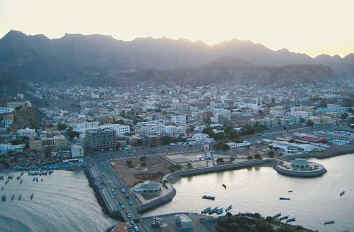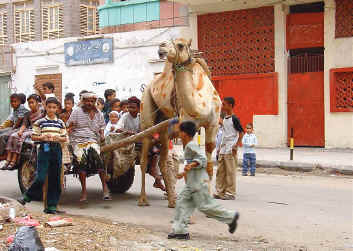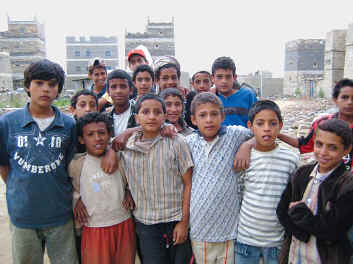Teaching English in Aden
Thanos Petouris
The author, a member of the Society, is a PhD candidate at the School of Oriental and African Studies, University of London.
I have always thought that there was something providential in the way in which I, as a graduate in my mid-twenties, first came to know Yemen in 2005, through working in Aden as an amateur teacher of English. ‘Choosing Yemen as an introduction to the Middle Eastern world, is like jumping into the middle of the ocean to learn swimming!’, exclaimed an American fellow teacher, with extended experience of the region, after hearing the reasons for my visit to the country.
Teaching is a profoundly interactive exercise, which can equally affect the views of the teacher and of the person being taught; and it was not long before I found myself being educated by the very Yemeni students whom I was expected to introduce to the complexities of the English language, and the intrinsic nature of the Western way of life.
Teaching a foreign language is not an exercise in vitro. It involves human beings of different ages, social and cultural backgrounds, who have their own preconceptions about the world around them, and thus present one with a constant flow of challenges and new experiences. Teaching also involves a process which allows one to better understand the community in which one lives, and at the same time to re-evaluate the ways in which one’s own culture is being perceived by one’s students. On the basis of my experience of teaching at the Modern American Language Institute (MALI) in Khormaksar, Aden, and of visiting local government schools to test and identify potential candidates for the Institute’s English language scholarship programme, I will try to offer some impressions of Yemeni youth formed through contact with my Adeni students.

|
View of Crater from Sirah island. Photo: Thanos Petouris |
What one cannot possibly overstate when discussing the role of education in Yemen, is the thirst of the new generation for learning, especially when it comes to learning a foreign language. There is widespread trust not only in the ability of education to offer one a better life, or better employment opportunities, but also in the proposition that a new, educated generation of Yemenis can find solutions to the chronic problems that have been plaguing the country for decades. In this respect, a salient difference between students in Europe and Yemen is that the Yemenis take every opportunity to make the best out of the evidently scarce educational material and resources at their disposal. Before even organising the course which I was going to teach, I found myself immersed in a sea of requests for extra homework, written assignments, even out-of-school meetings with students who wanted to practise their English as much as they could.
Another unmissable characteristic of these students was the diversity of their social and geographic origins. Contrary to one’s expectation of finding a highly privileged minority of boys and girls of affluent Adeni families attending the Institute, it soon became clear to me that my classes included students from such underprivileged areas as Dar Saad and Shaykh ‘Uthman as well as ones from as far away as Yafa’ or Hadhramawt. It would appear that a considerable number of families were ready to make significant sacrifices for the benefit of their children.
The greatest surprise, however, came when comparing the numbers of boys and girls who attended the school. Between 2005 and 2007 (when I returned to MALI for a few months) there was a marked increase in the number of female students who now made up about half the total number of students. Being able to teach mixed classes and to observe closely the relationship between the two sexes, I would immediately say that the images of passivity and marginalisation reproduced in the West with regard to women in such traditional societies as Yemen, rapidly vanish before one’s eyes. Not only have I had the opportunity to teach girls whose dreams were to become businesswomen, or to study medicine or law, and to acquire a more active role within society; but I was also able to experience the extent to which female students were more progressive and forward thinking than their male counterparts in their ideas about the kind of lives they wanted for themselves and their families. I believe that if there is any hope for the future of the country, then it certainly lies in the hands of women.

|
Crater, Aden. Photo: Thanos Petouris |
Nonetheless, this does not mean that young men adopt a passive stance towards what is happening in their country; they just tend to refer to issues such as corruption, poverty and the consumption of qat with a degree of cynicism. While they can identify the main causes of Yemen’s underdevelopment, they are clearly dubious whether the present political configuration can provide viable solutions. Despite expressing readiness to change their world, in practice they tend to approach the future rather warily.
Over the past months the international media and certain think tanks have consistently portrayed Yemen as a potentially failed state, sometimes competing among themselves to predict whether civil unrest, rising prices, dwindling natural resources, transnational terrorism will singly or collectively bring about its demise. However, the opportunity to meet and talk with the youth of Aden – not only the privileged ones of the private language schools but also students from the impoverished neighbourhoods of Buraiqa – has given me grounds for hope and optimism about the future of the country. It is true that the new generation are cynical about the likelihood of solutions being found in the near future to the problems confronting the country, but the confidence which they appear to feel in their own ability to build a better society for themselves and their children is uplifting.

|
Schoolboys in Upper Yafa’ keen to practise their English. Photo: Thanos Petouris |
